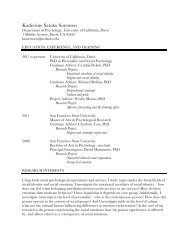The Psychology of Creativity:
The Psychology of Creativity:
The Psychology of Creativity:
Create successful ePaper yourself
Turn your PDF publications into a flip-book with our unique Google optimized e-Paper software.
History <strong>of</strong> <strong>Creativity</strong> Research 23<br />
and yet another with the creative product. But a complete theory will handle process, person, and product – plus the<br />
sociocultural environments that affect all three aspects. I personally believe that evolutionary psychology has the<br />
best opportunity to provide such comprehensiveness, but later developments may prove me wrong (Simonton,<br />
1999a). <strong>The</strong> second front concerns predictive precision. It is one matter to explicate a phenomenon, quite another<br />
to make precise predictions that can be subjected to empirical tests. For good reasons the maturity <strong>of</strong> any science is<br />
gauged by predictive power, not just explanatory utility. It is for this reason that I have several times proposed<br />
mathematical models that predict certain key features <strong>of</strong> creativity (Simonton, 1979, 1985, 1997, 1999c). Yet I am<br />
almost alone in doing so. To be sure, it is conceivable that psychology can never be an exact science, or at least not<br />
with respect to elusive phenomena like human creativity. Still, it is worth a try.<br />
4. We need to develop better practical applications. After all, creativity can be considered among the most<br />
important <strong>of</strong> all human activities. Our homes and <strong>of</strong>fices are filled with furniture, appliances, and other<br />
conveniences that are the products <strong>of</strong> human inventiveness. We amuse ourselves with the comics in the daily paper,<br />
take novels with us to while away the hours on the plane or at the beach, go to movie theaters to see the latest<br />
blockbuster, watch television shows and commercials, play games on the computer, attend concerts from classical<br />
and jazz to rock and soul, visit museums that display the artistic artifacts <strong>of</strong> cultures and civilizations – again all<br />
implicitly bearing ample testimony to the consequences <strong>of</strong> the creative mind. <strong>The</strong> buildings we enter, the cars we<br />
drive, the clothes we wear – even the music we hear in the elevators – are all exemplars <strong>of</strong> some form <strong>of</strong> creativity.<br />
Given these consequences for everyday lives, psychologists must learn how to promote creative development and<br />
expression (see, e.g., Nickerson, 1999). It is probably especially urgent to discover how to encourage creativity in<br />
those who have tended to be underrepresented among creators, such as women, minorities, older persons, and<br />
denizens <strong>of</strong> the developing world.<br />
If psychologists pursue the directions just indicated, I prophesy not only that creativity will continue to<br />
have a history, but also that creativity research will make history.
















